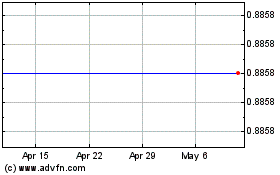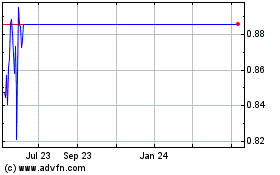Dell Sets Price Talk on EMC Deal Bonds
May 16 2016 - 1:40PM
Dow Jones News
Dell Inc. took a major step toward selling at least $16 billion
of secured bonds backing its acquisition of EMC Corp. Monday,
opening the process on Wall Street of setting yields on various
debt maturities.
Dell is offering investors a high interest rate by the standards
of investment-grade bonds, with the yield on a 10-year bond guided
at around 4.75 percentage points above Treasurys, or roughly 6.5%,
people familiar with the matter said. The issuance could span as
many as six fixed-rate tranches of maturities ranging from three
years to 30 years, as well as three-year and five-year
floating-rate bonds.
Investors have demanded a hefty yield for several reasons,
including the large debt load that the computer maker is assuming
and its uncertain long-term prospects as it tries to adapt to a
changing tech landscape.
Monday's "price talk" moves the company closer to completing the
largest bond offering since Anheuser-Busch InBev NV's $46 billion
offering in January.
Still, the cost of debt financing for corporations has dropped
considerably in recent months as recession fears have waned and the
Federal Reserve has assured investors that it is in no hurry to
raise interest rates.
At a time of ultralow interest rates but a still fragile global
economy, investment-grade bonds are especially popular now because
they offer higher yields than government bonds without the risk of
junk-rated bonds or stocks.
Investors poured $2.1 billion into investment-grade mutual funds
and exchange-traded funds in the week ended May 11, bringing the
year-to-date inflow to $36.1 billion, compared with $10.5 billion
for high yield funds and an outflow of $47.4 billion for equity
funds, according to Bank of America Merrill Lynch analysts.
As a result, Dell has tried to maximize the amount of its
investment grade bond issuance while minimizing other types of
debt, including certain loans and junk-rated unsecured bonds.
With the help of an asset sale and cash generated since it
announced its acquisition of EMC in October, Dell has managed to
reduce the expected size of its unsecured bonds to $3.25 billion
from $9 billion. Although it had planned to syndicate $8 billion of
"institutional" loans to nonbank investors, that number could also
come down if the company can issue more than $16 billion of secured
bonds, investors said. Both the unsecured bonds and loans will
likely be syndicated in the coming weeks, investors said.
Dell's unsecured bonds are rated sub-investment grade because
they sit lower in Dell's capital structure than the company's loans
and secured bonds, giving them a lower chance at a full recovery in
any potential bankruptcy.
Dell, which itself is rated just below investment grade by all
three major ratings firms, got a boost last week when Moody's
Investors Service rated its secured bonds Baa 3, its lowest
investment grade rating and a notch higher than what some analysts
had expected. That ensured that all three rating firms rated the
bonds investment grade, making them more appealing to investors
unaccustomed to buying bonds from riskier companies.
Dell expects to close its acquisition of EMC by the end of
October, pending approval from Chinese regulators and a vote by EMC
shareholders that is expected to take place by July.
The secured bond deal is underwritten by Credit Suisse Group AG,
J.P. Morgan Chase & Co., Bank of America Corp., Barclays PLC,
Citigroup Inc., Goldman Sachs Group Inc., Deutsche Bank AG and RBC
Capital Markets.
Write to Sam Goldfarb at sam.goldfarb@wsj.com
(END) Dow Jones Newswires
May 16, 2016 13:25 ET (17:25 GMT)
Copyright (c) 2016 Dow Jones & Company, Inc.
Credit Suisse (NYSE:CS)
Historical Stock Chart
From Mar 2024 to Apr 2024

Credit Suisse (NYSE:CS)
Historical Stock Chart
From Apr 2023 to Apr 2024
